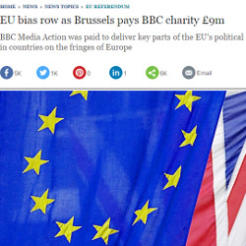After the Telegraph accused a charity of promoting "pro-European propaganda", Kirsty Weakley looks at whether other charities risk getting unfairly dragged into the EU referendum debate.
Over the weekend Telegraph reported that the BBC was at the “centre of a new row over bias in its coverage of Europe” because one of the charities it supports, BBC Media Action, had received £9m from the European Union.
It hammered this home by saying that “senior Tories” were concerned about the BBC’s ability to report impartially on the upcoming EU referendum campaign.
Andrew Bridgen, Conservative MP for North West Leicestershire, is quoted as saying, “The BBC’s pet charity may well be doing good work but I am concerned that it is taking EU money to do Brussels' bidding and to promote pro-European propaganda.”
Accusing a charity of promoting propaganda is a serious charge, and one that I was surprised was not countered more strongly. The BBC simply issued a statement insisting that its news operation was entirely independent and not addressing the suggesting that he charity was a mouthpiece for propaganda. The Charity Commission has confirmed that it is not investigating the charity.
And the charity said: "BBC Media Action is an independent charity which works to support free and fair journalism and reduce poverty around the world. Its work has absolutely no bearing on the BBC’s editorial decisions.”
While this might seem that this part of a wider campaign to discredit the BBC, there are a number of damaging allegations about charitable funding that should be of concern for the wider sector.
This is particularly true because the tone of the piece echoes opinions voiced by Conservatives taking part in a panel debate organised at their party conference. It indicates that some of those on the right continue to lack understanding about the sector and feel a deepening dissatisfaction with how charities are funded.
Criticism of charities that receive any funding from government is nothing we haven’t seen before, but the focus on funding from the EU risks dragging charities into the referendum debate.
Charities are seen as pro-EU because they receive a lot of funding from it. In previous referendums political campaigners have, with greater and lesser degrees of success, tried to silence charities who have advocated a particular point of view.
One potential danger is that charities which wish to campaign on other issues could also find limitations placed on their ability to speak out. This may be the first but is probably not the last salvo in this particular battle.
Worrying omissions
So when this kind of thing does happen, how should charities respond?
In this particular instance, there are a number of aspects of the Telegraph’s piece that should have been clarified by the charity.
Firstly there a number of omissions in the Telegraph article. For one thing the readers doesn’t discover that the £9m figure refers to a cumulative total between 2011 and 2014 until they are half way down.
Furthermore it omits the fact that in that same period the charity’s total income was more than £135m. In other words the contribution from the EU was a measly 7 per cent.
The largest single donor in 2014 was in fact the UK Department for International Development, which supports the charity’s work through a five-year global grant. It also received funding from other governments, the Bill and Melinda Gates Foundation and number of United Nations agencies.
Ammendment: This article has been updated to inlcude the correct quote from BBC Media Action









